Legal Aspects of Business: Agency Relationships, Laws and Regulations
VerifiedAdded on 2023/01/13
|8
|2762
|72
Report
AI Summary
This report provides a detailed analysis of the legal aspects of agency relationships in a business context. It begins with an introduction to agency, highlighting its significance in defining business structures and ensuring compliance with legal frameworks. The main body explores the creation of agency relationships, the roles of agents and principals, and the fiduciary duties involved. It delves into specific duties such as the duty to follow instructions, duty of care and skills, duty to avoid conflicts of interest, duty to account, duty not to delegate authority, and duty not to accept bribes or secret profits, with relevant case laws illustrating these principles. The report emphasizes the importance of agency in modern business, its impact on economic growth, and the ethical and legal responsibilities of agents. The conclusion summarizes the vital role of agency principles in a complex business environment, ensuring that agents perform their functions legally and ethically, and contribute to the growth of business organizations.
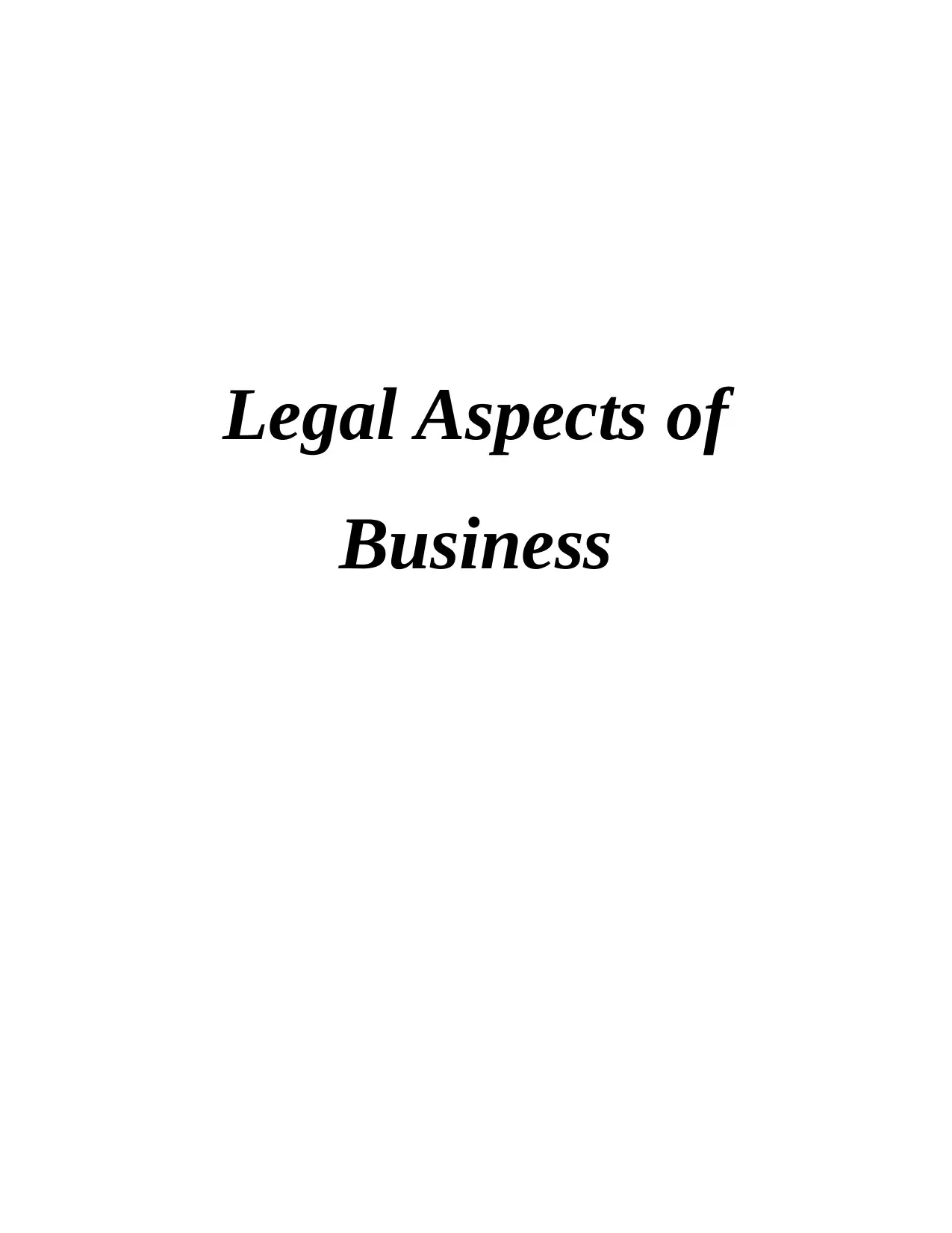
Legal Aspects of
Business
Business
Paraphrase This Document
Need a fresh take? Get an instant paraphrase of this document with our AI Paraphraser

Table of Contents
INTRODUCTION...........................................................................................................................1
MAIN BODY...................................................................................................................................2
CONCLUSION................................................................................................................................5
REFERENCES................................................................................................................................6
INTRODUCTION...........................................................................................................................1
MAIN BODY...................................................................................................................................2
CONCLUSION................................................................................................................................5
REFERENCES................................................................................................................................6
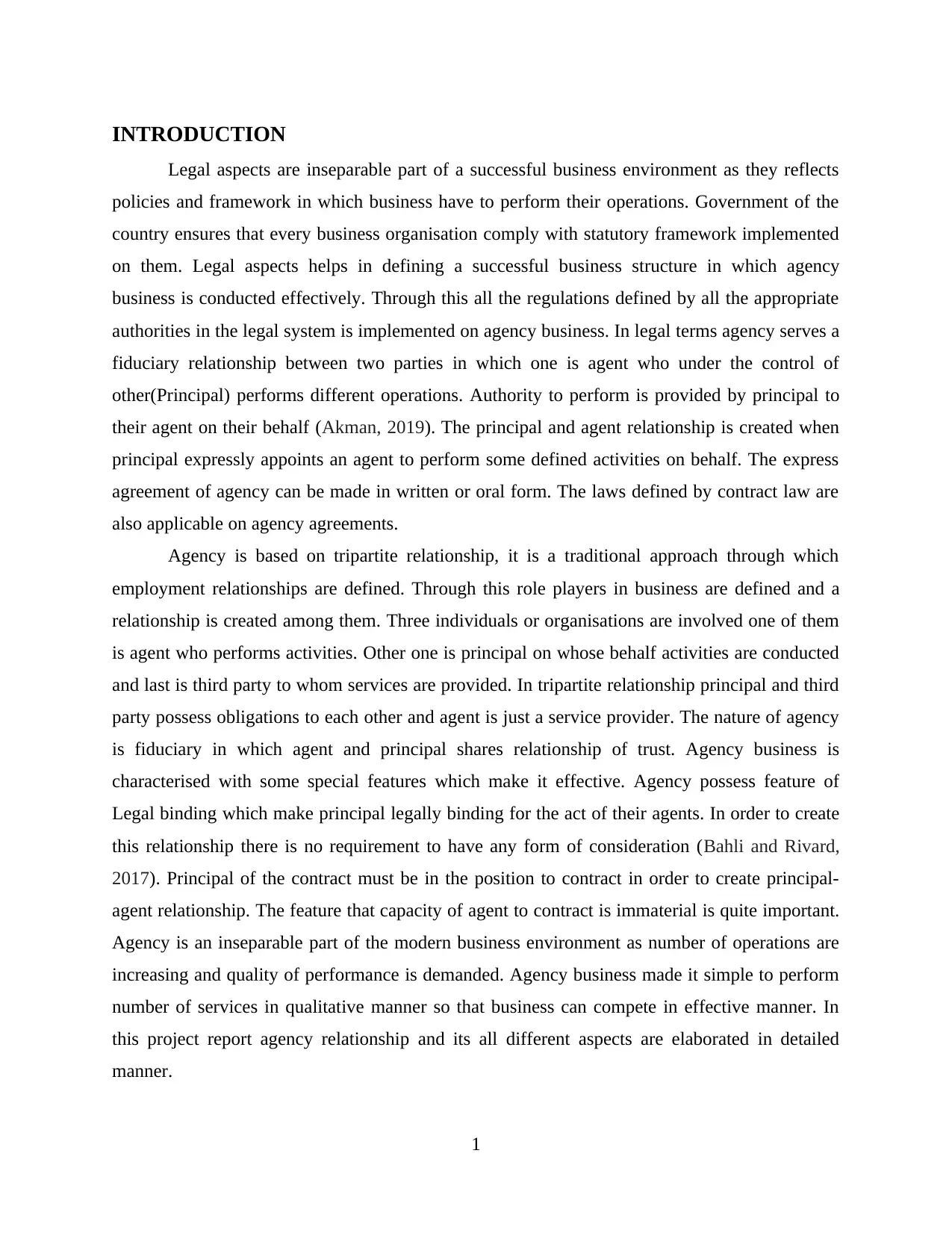
INTRODUCTION
Legal aspects are inseparable part of a successful business environment as they reflects
policies and framework in which business have to perform their operations. Government of the
country ensures that every business organisation comply with statutory framework implemented
on them. Legal aspects helps in defining a successful business structure in which agency
business is conducted effectively. Through this all the regulations defined by all the appropriate
authorities in the legal system is implemented on agency business. In legal terms agency serves a
fiduciary relationship between two parties in which one is agent who under the control of
other(Principal) performs different operations. Authority to perform is provided by principal to
their agent on their behalf (Akman, 2019). The principal and agent relationship is created when
principal expressly appoints an agent to perform some defined activities on behalf. The express
agreement of agency can be made in written or oral form. The laws defined by contract law are
also applicable on agency agreements.
Agency is based on tripartite relationship, it is a traditional approach through which
employment relationships are defined. Through this role players in business are defined and a
relationship is created among them. Three individuals or organisations are involved one of them
is agent who performs activities. Other one is principal on whose behalf activities are conducted
and last is third party to whom services are provided. In tripartite relationship principal and third
party possess obligations to each other and agent is just a service provider. The nature of agency
is fiduciary in which agent and principal shares relationship of trust. Agency business is
characterised with some special features which make it effective. Agency possess feature of
Legal binding which make principal legally binding for the act of their agents. In order to create
this relationship there is no requirement to have any form of consideration (Bahli and Rivard,
2017). Principal of the contract must be in the position to contract in order to create principal-
agent relationship. The feature that capacity of agent to contract is immaterial is quite important.
Agency is an inseparable part of the modern business environment as number of operations are
increasing and quality of performance is demanded. Agency business made it simple to perform
number of services in qualitative manner so that business can compete in effective manner. In
this project report agency relationship and its all different aspects are elaborated in detailed
manner.
1
Legal aspects are inseparable part of a successful business environment as they reflects
policies and framework in which business have to perform their operations. Government of the
country ensures that every business organisation comply with statutory framework implemented
on them. Legal aspects helps in defining a successful business structure in which agency
business is conducted effectively. Through this all the regulations defined by all the appropriate
authorities in the legal system is implemented on agency business. In legal terms agency serves a
fiduciary relationship between two parties in which one is agent who under the control of
other(Principal) performs different operations. Authority to perform is provided by principal to
their agent on their behalf (Akman, 2019). The principal and agent relationship is created when
principal expressly appoints an agent to perform some defined activities on behalf. The express
agreement of agency can be made in written or oral form. The laws defined by contract law are
also applicable on agency agreements.
Agency is based on tripartite relationship, it is a traditional approach through which
employment relationships are defined. Through this role players in business are defined and a
relationship is created among them. Three individuals or organisations are involved one of them
is agent who performs activities. Other one is principal on whose behalf activities are conducted
and last is third party to whom services are provided. In tripartite relationship principal and third
party possess obligations to each other and agent is just a service provider. The nature of agency
is fiduciary in which agent and principal shares relationship of trust. Agency business is
characterised with some special features which make it effective. Agency possess feature of
Legal binding which make principal legally binding for the act of their agents. In order to create
this relationship there is no requirement to have any form of consideration (Bahli and Rivard,
2017). Principal of the contract must be in the position to contract in order to create principal-
agent relationship. The feature that capacity of agent to contract is immaterial is quite important.
Agency is an inseparable part of the modern business environment as number of operations are
increasing and quality of performance is demanded. Agency business made it simple to perform
number of services in qualitative manner so that business can compete in effective manner. In
this project report agency relationship and its all different aspects are elaborated in detailed
manner.
1
⊘ This is a preview!⊘
Do you want full access?
Subscribe today to unlock all pages.

Trusted by 1+ million students worldwide
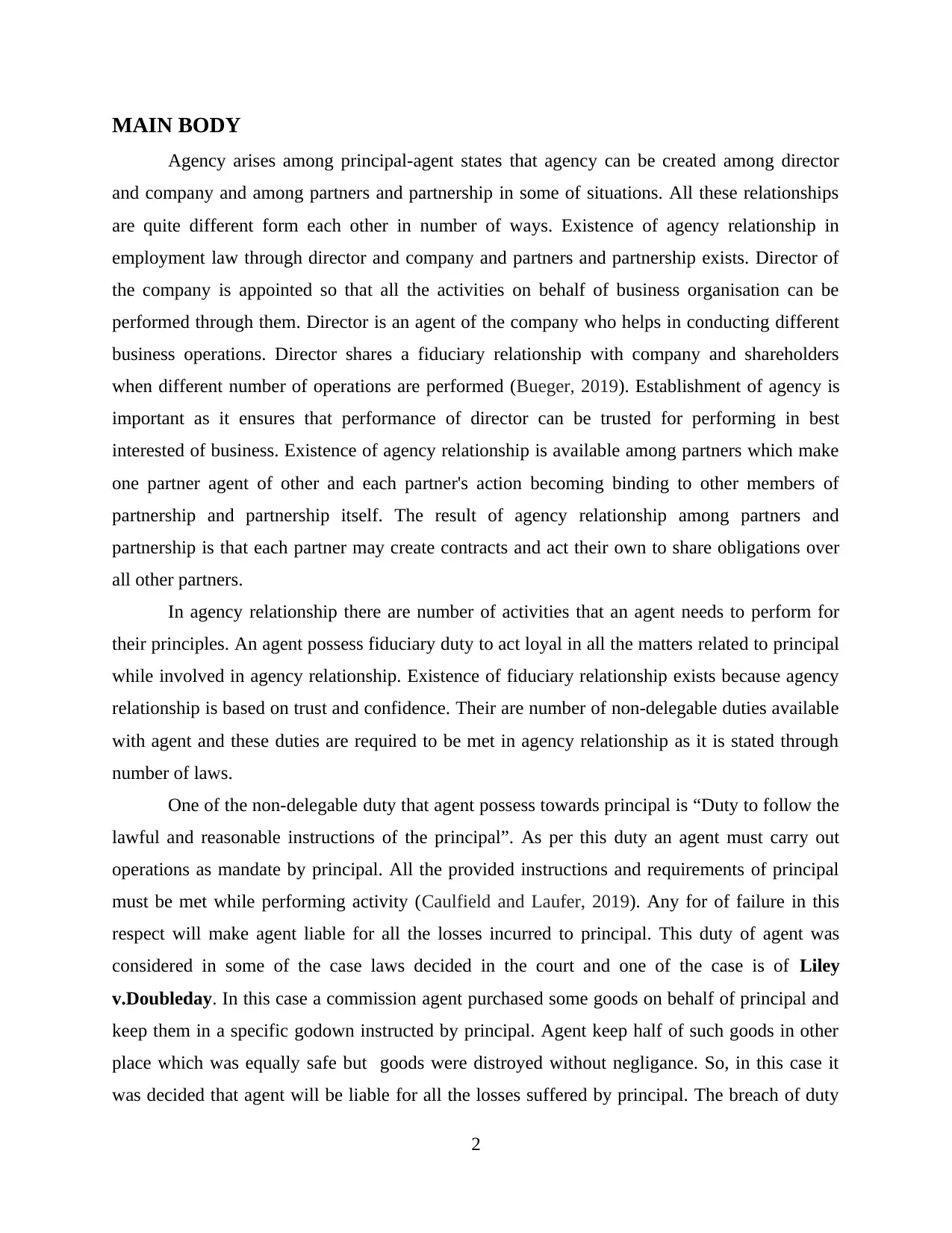
MAIN BODY
Agency arises among principal-agent states that agency can be created among director
and company and among partners and partnership in some of situations. All these relationships
are quite different form each other in number of ways. Existence of agency relationship in
employment law through director and company and partners and partnership exists. Director of
the company is appointed so that all the activities on behalf of business organisation can be
performed through them. Director is an agent of the company who helps in conducting different
business operations. Director shares a fiduciary relationship with company and shareholders
when different number of operations are performed (Bueger, 2019). Establishment of agency is
important as it ensures that performance of director can be trusted for performing in best
interested of business. Existence of agency relationship is available among partners which make
one partner agent of other and each partner's action becoming binding to other members of
partnership and partnership itself. The result of agency relationship among partners and
partnership is that each partner may create contracts and act their own to share obligations over
all other partners.
In agency relationship there are number of activities that an agent needs to perform for
their principles. An agent possess fiduciary duty to act loyal in all the matters related to principal
while involved in agency relationship. Existence of fiduciary relationship exists because agency
relationship is based on trust and confidence. Their are number of non-delegable duties available
with agent and these duties are required to be met in agency relationship as it is stated through
number of laws.
One of the non-delegable duty that agent possess towards principal is “Duty to follow the
lawful and reasonable instructions of the principal”. As per this duty an agent must carry out
operations as mandate by principal. All the provided instructions and requirements of principal
must be met while performing activity (Caulfield and Laufer, 2019). Any for of failure in this
respect will make agent liable for all the losses incurred to principal. This duty of agent was
considered in some of the case laws decided in the court and one of the case is of Liley
v.Doubleday. In this case a commission agent purchased some goods on behalf of principal and
keep them in a specific godown instructed by principal. Agent keep half of such goods in other
place which was equally safe but goods were distroyed without negligance. So, in this case it
was decided that agent will be liable for all the losses suffered by principal. The breach of duty
2
Agency arises among principal-agent states that agency can be created among director
and company and among partners and partnership in some of situations. All these relationships
are quite different form each other in number of ways. Existence of agency relationship in
employment law through director and company and partners and partnership exists. Director of
the company is appointed so that all the activities on behalf of business organisation can be
performed through them. Director is an agent of the company who helps in conducting different
business operations. Director shares a fiduciary relationship with company and shareholders
when different number of operations are performed (Bueger, 2019). Establishment of agency is
important as it ensures that performance of director can be trusted for performing in best
interested of business. Existence of agency relationship is available among partners which make
one partner agent of other and each partner's action becoming binding to other members of
partnership and partnership itself. The result of agency relationship among partners and
partnership is that each partner may create contracts and act their own to share obligations over
all other partners.
In agency relationship there are number of activities that an agent needs to perform for
their principles. An agent possess fiduciary duty to act loyal in all the matters related to principal
while involved in agency relationship. Existence of fiduciary relationship exists because agency
relationship is based on trust and confidence. Their are number of non-delegable duties available
with agent and these duties are required to be met in agency relationship as it is stated through
number of laws.
One of the non-delegable duty that agent possess towards principal is “Duty to follow the
lawful and reasonable instructions of the principal”. As per this duty an agent must carry out
operations as mandate by principal. All the provided instructions and requirements of principal
must be met while performing activity (Caulfield and Laufer, 2019). Any for of failure in this
respect will make agent liable for all the losses incurred to principal. This duty of agent was
considered in some of the case laws decided in the court and one of the case is of Liley
v.Doubleday. In this case a commission agent purchased some goods on behalf of principal and
keep them in a specific godown instructed by principal. Agent keep half of such goods in other
place which was equally safe but goods were distroyed without negligance. So, in this case it
was decided that agent will be liable for all the losses suffered by principal. The breach of duty
2
Paraphrase This Document
Need a fresh take? Get an instant paraphrase of this document with our AI Paraphraser
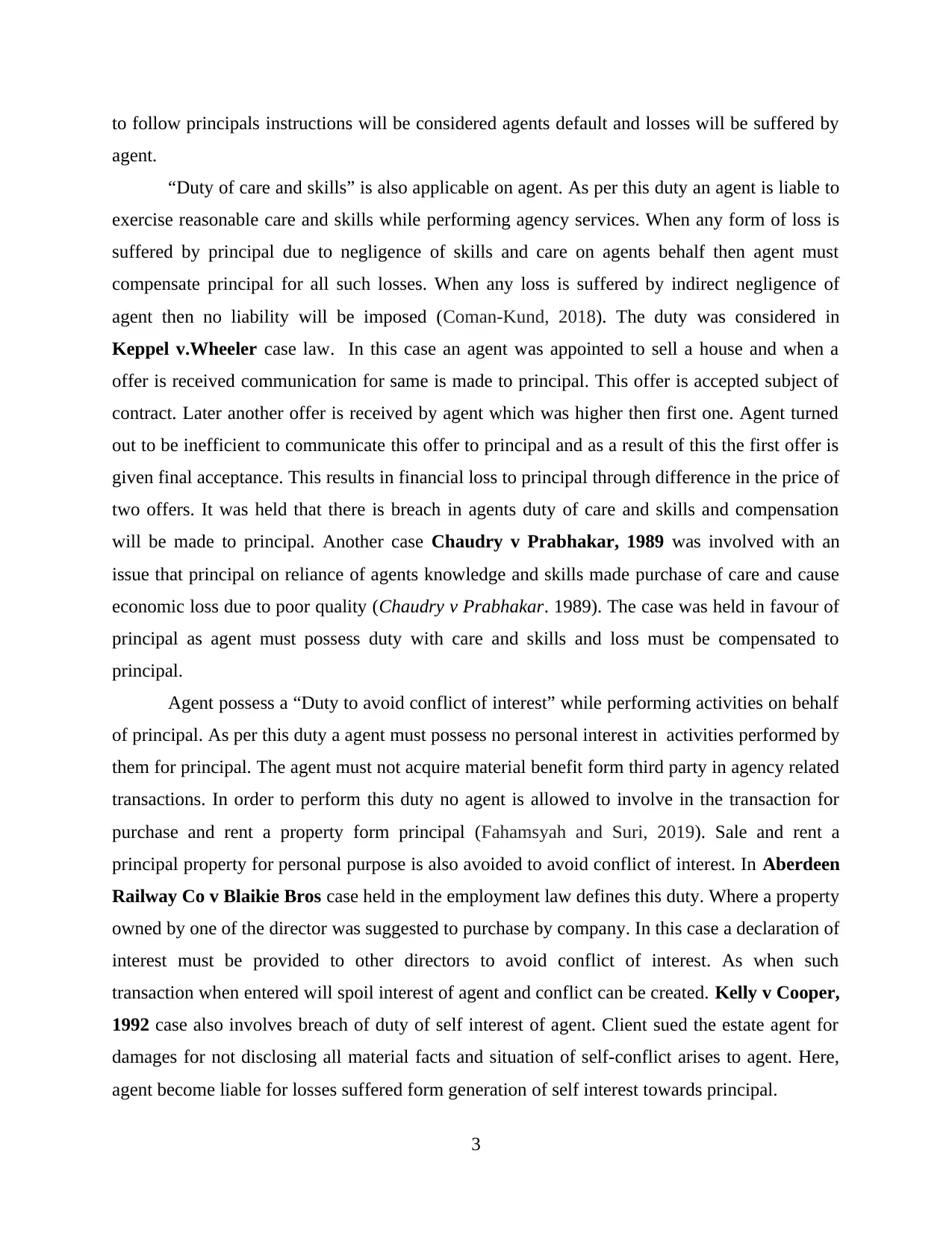
to follow principals instructions will be considered agents default and losses will be suffered by
agent.
“Duty of care and skills” is also applicable on agent. As per this duty an agent is liable to
exercise reasonable care and skills while performing agency services. When any form of loss is
suffered by principal due to negligence of skills and care on agents behalf then agent must
compensate principal for all such losses. When any loss is suffered by indirect negligence of
agent then no liability will be imposed (Coman-Kund, 2018). The duty was considered in
Keppel v.Wheeler case law. In this case an agent was appointed to sell a house and when a
offer is received communication for same is made to principal. This offer is accepted subject of
contract. Later another offer is received by agent which was higher then first one. Agent turned
out to be inefficient to communicate this offer to principal and as a result of this the first offer is
given final acceptance. This results in financial loss to principal through difference in the price of
two offers. It was held that there is breach in agents duty of care and skills and compensation
will be made to principal. Another case Chaudry v Prabhakar, 1989 was involved with an
issue that principal on reliance of agents knowledge and skills made purchase of care and cause
economic loss due to poor quality (Chaudry v Prabhakar. 1989). The case was held in favour of
principal as agent must possess duty with care and skills and loss must be compensated to
principal.
Agent possess a “Duty to avoid conflict of interest” while performing activities on behalf
of principal. As per this duty a agent must possess no personal interest in activities performed by
them for principal. The agent must not acquire material benefit form third party in agency related
transactions. In order to perform this duty no agent is allowed to involve in the transaction for
purchase and rent a property form principal (Fahamsyah and Suri, 2019). Sale and rent a
principal property for personal purpose is also avoided to avoid conflict of interest. In Aberdeen
Railway Co v Blaikie Bros case held in the employment law defines this duty. Where a property
owned by one of the director was suggested to purchase by company. In this case a declaration of
interest must be provided to other directors to avoid conflict of interest. As when such
transaction when entered will spoil interest of agent and conflict can be created. Kelly v Cooper,
1992 case also involves breach of duty of self interest of agent. Client sued the estate agent for
damages for not disclosing all material facts and situation of self-conflict arises to agent. Here,
agent become liable for losses suffered form generation of self interest towards principal.
3
agent.
“Duty of care and skills” is also applicable on agent. As per this duty an agent is liable to
exercise reasonable care and skills while performing agency services. When any form of loss is
suffered by principal due to negligence of skills and care on agents behalf then agent must
compensate principal for all such losses. When any loss is suffered by indirect negligence of
agent then no liability will be imposed (Coman-Kund, 2018). The duty was considered in
Keppel v.Wheeler case law. In this case an agent was appointed to sell a house and when a
offer is received communication for same is made to principal. This offer is accepted subject of
contract. Later another offer is received by agent which was higher then first one. Agent turned
out to be inefficient to communicate this offer to principal and as a result of this the first offer is
given final acceptance. This results in financial loss to principal through difference in the price of
two offers. It was held that there is breach in agents duty of care and skills and compensation
will be made to principal. Another case Chaudry v Prabhakar, 1989 was involved with an
issue that principal on reliance of agents knowledge and skills made purchase of care and cause
economic loss due to poor quality (Chaudry v Prabhakar. 1989). The case was held in favour of
principal as agent must possess duty with care and skills and loss must be compensated to
principal.
Agent possess a “Duty to avoid conflict of interest” while performing activities on behalf
of principal. As per this duty a agent must possess no personal interest in activities performed by
them for principal. The agent must not acquire material benefit form third party in agency related
transactions. In order to perform this duty no agent is allowed to involve in the transaction for
purchase and rent a property form principal (Fahamsyah and Suri, 2019). Sale and rent a
principal property for personal purpose is also avoided to avoid conflict of interest. In Aberdeen
Railway Co v Blaikie Bros case held in the employment law defines this duty. Where a property
owned by one of the director was suggested to purchase by company. In this case a declaration of
interest must be provided to other directors to avoid conflict of interest. As when such
transaction when entered will spoil interest of agent and conflict can be created. Kelly v Cooper,
1992 case also involves breach of duty of self interest of agent. Client sued the estate agent for
damages for not disclosing all material facts and situation of self-conflict arises to agent. Here,
agent become liable for losses suffered form generation of self interest towards principal.
3
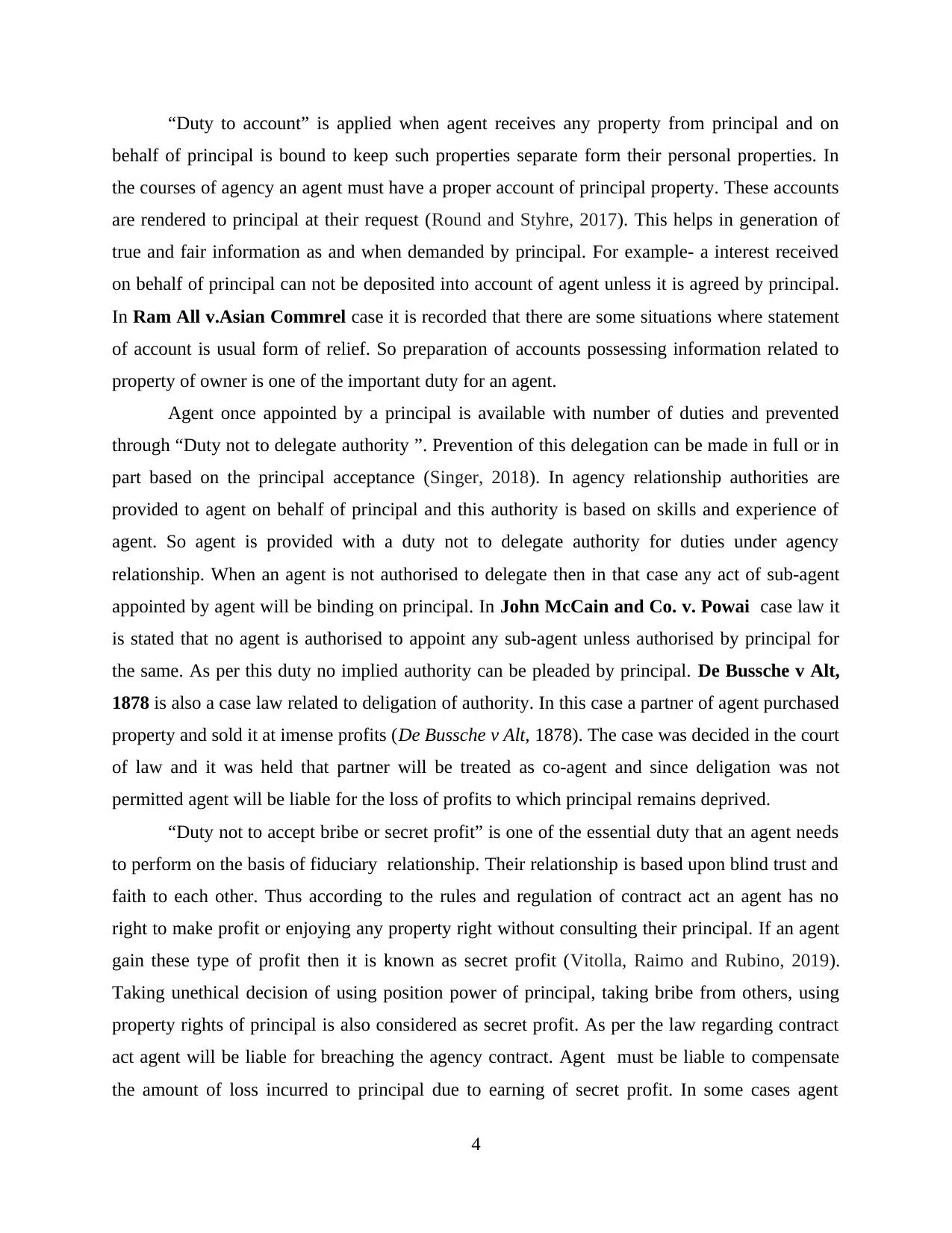
“Duty to account” is applied when agent receives any property from principal and on
behalf of principal is bound to keep such properties separate form their personal properties. In
the courses of agency an agent must have a proper account of principal property. These accounts
are rendered to principal at their request (Round and Styhre, 2017). This helps in generation of
true and fair information as and when demanded by principal. For example- a interest received
on behalf of principal can not be deposited into account of agent unless it is agreed by principal.
In Ram All v.Asian Commrel case it is recorded that there are some situations where statement
of account is usual form of relief. So preparation of accounts possessing information related to
property of owner is one of the important duty for an agent.
Agent once appointed by a principal is available with number of duties and prevented
through “Duty not to delegate authority ”. Prevention of this delegation can be made in full or in
part based on the principal acceptance (Singer, 2018). In agency relationship authorities are
provided to agent on behalf of principal and this authority is based on skills and experience of
agent. So agent is provided with a duty not to delegate authority for duties under agency
relationship. When an agent is not authorised to delegate then in that case any act of sub-agent
appointed by agent will be binding on principal. In John McCain and Co. v. Powai case law it
is stated that no agent is authorised to appoint any sub-agent unless authorised by principal for
the same. As per this duty no implied authority can be pleaded by principal. De Bussche v Alt,
1878 is also a case law related to deligation of authority. In this case a partner of agent purchased
property and sold it at imense profits (De Bussche v Alt, 1878). The case was decided in the court
of law and it was held that partner will be treated as co-agent and since deligation was not
permitted agent will be liable for the loss of profits to which principal remains deprived.
“Duty not to accept bribe or secret profit” is one of the essential duty that an agent needs
to perform on the basis of fiduciary relationship. Their relationship is based upon blind trust and
faith to each other. Thus according to the rules and regulation of contract act an agent has no
right to make profit or enjoying any property right without consulting their principal. If an agent
gain these type of profit then it is known as secret profit (Vitolla, Raimo and Rubino, 2019).
Taking unethical decision of using position power of principal, taking bribe from others, using
property rights of principal is also considered as secret profit. As per the law regarding contract
act agent will be liable for breaching the agency contract. Agent must be liable to compensate
the amount of loss incurred to principal due to earning of secret profit. In some cases agent
4
behalf of principal is bound to keep such properties separate form their personal properties. In
the courses of agency an agent must have a proper account of principal property. These accounts
are rendered to principal at their request (Round and Styhre, 2017). This helps in generation of
true and fair information as and when demanded by principal. For example- a interest received
on behalf of principal can not be deposited into account of agent unless it is agreed by principal.
In Ram All v.Asian Commrel case it is recorded that there are some situations where statement
of account is usual form of relief. So preparation of accounts possessing information related to
property of owner is one of the important duty for an agent.
Agent once appointed by a principal is available with number of duties and prevented
through “Duty not to delegate authority ”. Prevention of this delegation can be made in full or in
part based on the principal acceptance (Singer, 2018). In agency relationship authorities are
provided to agent on behalf of principal and this authority is based on skills and experience of
agent. So agent is provided with a duty not to delegate authority for duties under agency
relationship. When an agent is not authorised to delegate then in that case any act of sub-agent
appointed by agent will be binding on principal. In John McCain and Co. v. Powai case law it
is stated that no agent is authorised to appoint any sub-agent unless authorised by principal for
the same. As per this duty no implied authority can be pleaded by principal. De Bussche v Alt,
1878 is also a case law related to deligation of authority. In this case a partner of agent purchased
property and sold it at imense profits (De Bussche v Alt, 1878). The case was decided in the court
of law and it was held that partner will be treated as co-agent and since deligation was not
permitted agent will be liable for the loss of profits to which principal remains deprived.
“Duty not to accept bribe or secret profit” is one of the essential duty that an agent needs
to perform on the basis of fiduciary relationship. Their relationship is based upon blind trust and
faith to each other. Thus according to the rules and regulation of contract act an agent has no
right to make profit or enjoying any property right without consulting their principal. If an agent
gain these type of profit then it is known as secret profit (Vitolla, Raimo and Rubino, 2019).
Taking unethical decision of using position power of principal, taking bribe from others, using
property rights of principal is also considered as secret profit. As per the law regarding contract
act agent will be liable for breaching the agency contract. Agent must be liable to compensate
the amount of loss incurred to principal due to earning of secret profit. In some cases agent
4
⊘ This is a preview!⊘
Do you want full access?
Subscribe today to unlock all pages.

Trusted by 1+ million students worldwide
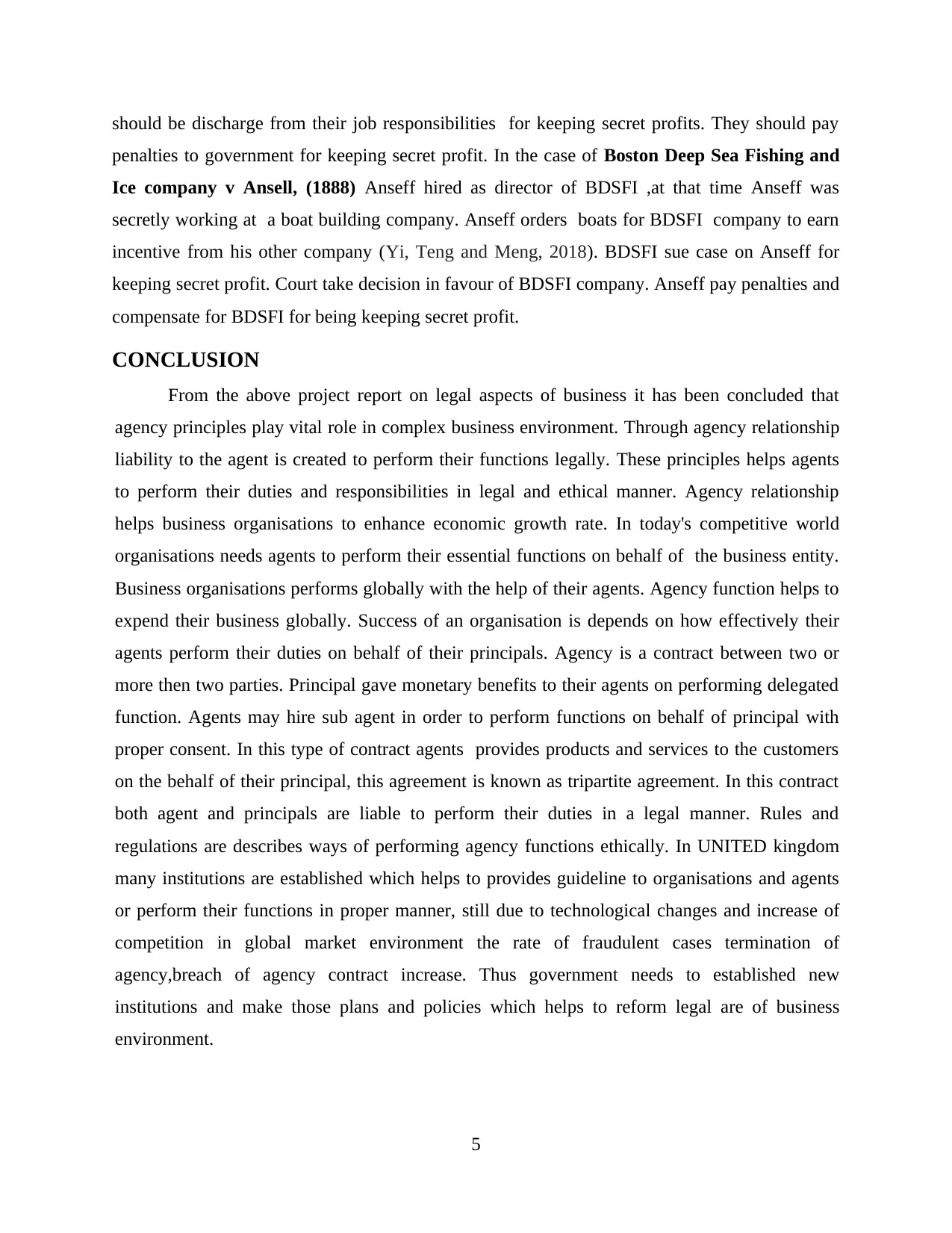
should be discharge from their job responsibilities for keeping secret profits. They should pay
penalties to government for keeping secret profit. In the case of Boston Deep Sea Fishing and
Ice company v Ansell, (1888) Anseff hired as director of BDSFI ,at that time Anseff was
secretly working at a boat building company. Anseff orders boats for BDSFI company to earn
incentive from his other company (Yi, Teng and Meng, 2018). BDSFI sue case on Anseff for
keeping secret profit. Court take decision in favour of BDSFI company. Anseff pay penalties and
compensate for BDSFI for being keeping secret profit.
CONCLUSION
From the above project report on legal aspects of business it has been concluded that
agency principles play vital role in complex business environment. Through agency relationship
liability to the agent is created to perform their functions legally. These principles helps agents
to perform their duties and responsibilities in legal and ethical manner. Agency relationship
helps business organisations to enhance economic growth rate. In today's competitive world
organisations needs agents to perform their essential functions on behalf of the business entity.
Business organisations performs globally with the help of their agents. Agency function helps to
expend their business globally. Success of an organisation is depends on how effectively their
agents perform their duties on behalf of their principals. Agency is a contract between two or
more then two parties. Principal gave monetary benefits to their agents on performing delegated
function. Agents may hire sub agent in order to perform functions on behalf of principal with
proper consent. In this type of contract agents provides products and services to the customers
on the behalf of their principal, this agreement is known as tripartite agreement. In this contract
both agent and principals are liable to perform their duties in a legal manner. Rules and
regulations are describes ways of performing agency functions ethically. In UNITED kingdom
many institutions are established which helps to provides guideline to organisations and agents
or perform their functions in proper manner, still due to technological changes and increase of
competition in global market environment the rate of fraudulent cases termination of
agency,breach of agency contract increase. Thus government needs to established new
institutions and make those plans and policies which helps to reform legal are of business
environment.
5
penalties to government for keeping secret profit. In the case of Boston Deep Sea Fishing and
Ice company v Ansell, (1888) Anseff hired as director of BDSFI ,at that time Anseff was
secretly working at a boat building company. Anseff orders boats for BDSFI company to earn
incentive from his other company (Yi, Teng and Meng, 2018). BDSFI sue case on Anseff for
keeping secret profit. Court take decision in favour of BDSFI company. Anseff pay penalties and
compensate for BDSFI for being keeping secret profit.
CONCLUSION
From the above project report on legal aspects of business it has been concluded that
agency principles play vital role in complex business environment. Through agency relationship
liability to the agent is created to perform their functions legally. These principles helps agents
to perform their duties and responsibilities in legal and ethical manner. Agency relationship
helps business organisations to enhance economic growth rate. In today's competitive world
organisations needs agents to perform their essential functions on behalf of the business entity.
Business organisations performs globally with the help of their agents. Agency function helps to
expend their business globally. Success of an organisation is depends on how effectively their
agents perform their duties on behalf of their principals. Agency is a contract between two or
more then two parties. Principal gave monetary benefits to their agents on performing delegated
function. Agents may hire sub agent in order to perform functions on behalf of principal with
proper consent. In this type of contract agents provides products and services to the customers
on the behalf of their principal, this agreement is known as tripartite agreement. In this contract
both agent and principals are liable to perform their duties in a legal manner. Rules and
regulations are describes ways of performing agency functions ethically. In UNITED kingdom
many institutions are established which helps to provides guideline to organisations and agents
or perform their functions in proper manner, still due to technological changes and increase of
competition in global market environment the rate of fraudulent cases termination of
agency,breach of agency contract increase. Thus government needs to established new
institutions and make those plans and policies which helps to reform legal are of business
environment.
5
Paraphrase This Document
Need a fresh take? Get an instant paraphrase of this document with our AI Paraphraser
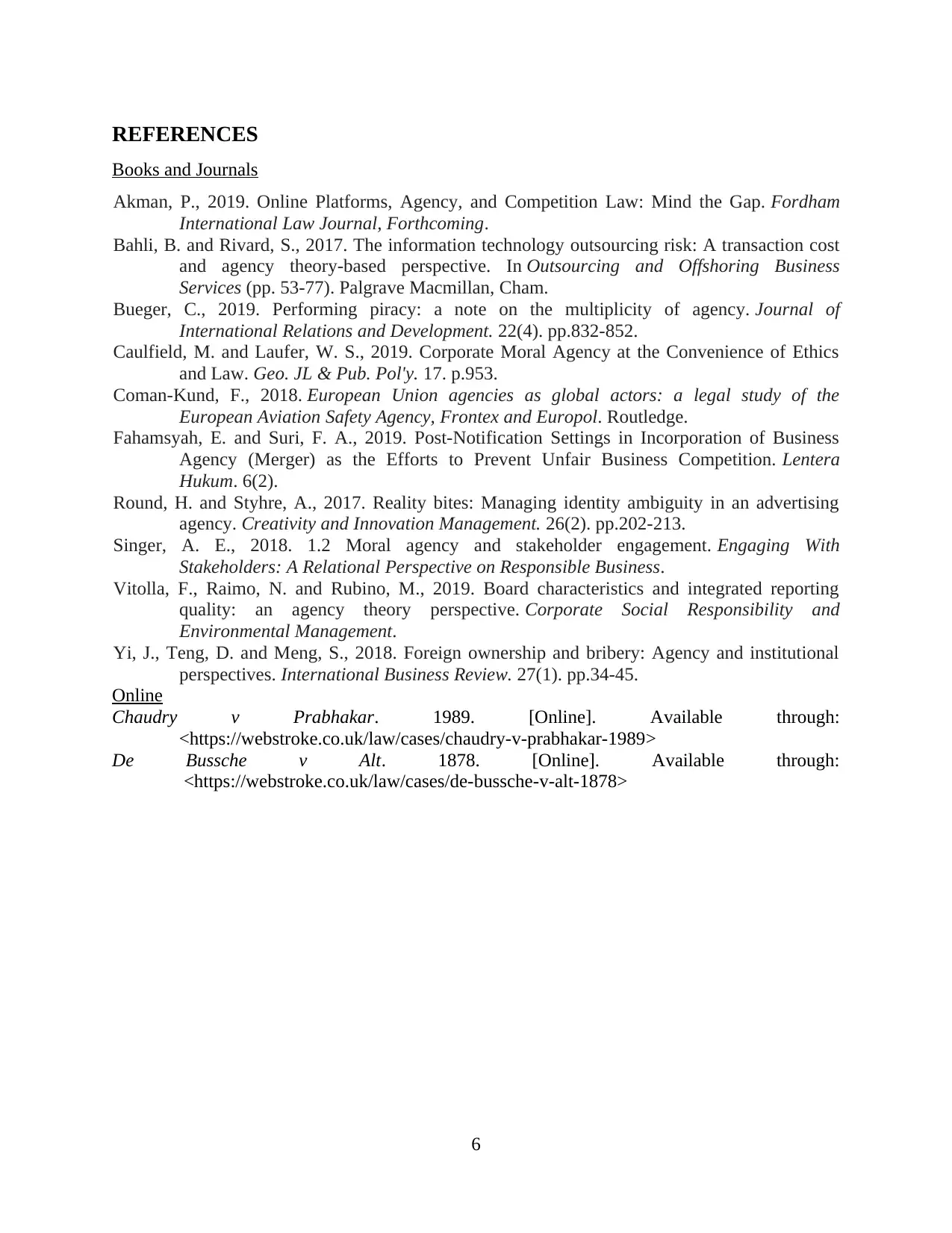
REFERENCES
Books and Journals
Akman, P., 2019. Online Platforms, Agency, and Competition Law: Mind the Gap. Fordham
International Law Journal, Forthcoming.
Bahli, B. and Rivard, S., 2017. The information technology outsourcing risk: A transaction cost
and agency theory-based perspective. In Outsourcing and Offshoring Business
Services (pp. 53-77). Palgrave Macmillan, Cham.
Bueger, C., 2019. Performing piracy: a note on the multiplicity of agency. Journal of
International Relations and Development. 22(4). pp.832-852.
Caulfield, M. and Laufer, W. S., 2019. Corporate Moral Agency at the Convenience of Ethics
and Law. Geo. JL & Pub. Pol'y. 17. p.953.
Coman-Kund, F., 2018. European Union agencies as global actors: a legal study of the
European Aviation Safety Agency, Frontex and Europol. Routledge.
Fahamsyah, E. and Suri, F. A., 2019. Post-Notification Settings in Incorporation of Business
Agency (Merger) as the Efforts to Prevent Unfair Business Competition. Lentera
Hukum. 6(2).
Round, H. and Styhre, A., 2017. Reality bites: Managing identity ambiguity in an advertising
agency. Creativity and Innovation Management. 26(2). pp.202-213.
Singer, A. E., 2018. 1.2 Moral agency and stakeholder engagement. Engaging With
Stakeholders: A Relational Perspective on Responsible Business.
Vitolla, F., Raimo, N. and Rubino, M., 2019. Board characteristics and integrated reporting
quality: an agency theory perspective. Corporate Social Responsibility and
Environmental Management.
Yi, J., Teng, D. and Meng, S., 2018. Foreign ownership and bribery: Agency and institutional
perspectives. International Business Review. 27(1). pp.34-45.
Online
Chaudry v Prabhakar. 1989. [Online]. Available through:
<https://webstroke.co.uk/law/cases/chaudry-v-prabhakar-1989>
De Bussche v Alt. 1878. [Online]. Available through:
<https://webstroke.co.uk/law/cases/de-bussche-v-alt-1878>
6
Books and Journals
Akman, P., 2019. Online Platforms, Agency, and Competition Law: Mind the Gap. Fordham
International Law Journal, Forthcoming.
Bahli, B. and Rivard, S., 2017. The information technology outsourcing risk: A transaction cost
and agency theory-based perspective. In Outsourcing and Offshoring Business
Services (pp. 53-77). Palgrave Macmillan, Cham.
Bueger, C., 2019. Performing piracy: a note on the multiplicity of agency. Journal of
International Relations and Development. 22(4). pp.832-852.
Caulfield, M. and Laufer, W. S., 2019. Corporate Moral Agency at the Convenience of Ethics
and Law. Geo. JL & Pub. Pol'y. 17. p.953.
Coman-Kund, F., 2018. European Union agencies as global actors: a legal study of the
European Aviation Safety Agency, Frontex and Europol. Routledge.
Fahamsyah, E. and Suri, F. A., 2019. Post-Notification Settings in Incorporation of Business
Agency (Merger) as the Efforts to Prevent Unfair Business Competition. Lentera
Hukum. 6(2).
Round, H. and Styhre, A., 2017. Reality bites: Managing identity ambiguity in an advertising
agency. Creativity and Innovation Management. 26(2). pp.202-213.
Singer, A. E., 2018. 1.2 Moral agency and stakeholder engagement. Engaging With
Stakeholders: A Relational Perspective on Responsible Business.
Vitolla, F., Raimo, N. and Rubino, M., 2019. Board characteristics and integrated reporting
quality: an agency theory perspective. Corporate Social Responsibility and
Environmental Management.
Yi, J., Teng, D. and Meng, S., 2018. Foreign ownership and bribery: Agency and institutional
perspectives. International Business Review. 27(1). pp.34-45.
Online
Chaudry v Prabhakar. 1989. [Online]. Available through:
<https://webstroke.co.uk/law/cases/chaudry-v-prabhakar-1989>
De Bussche v Alt. 1878. [Online]. Available through:
<https://webstroke.co.uk/law/cases/de-bussche-v-alt-1878>
6
1 out of 8
Related Documents
Your All-in-One AI-Powered Toolkit for Academic Success.
+13062052269
info@desklib.com
Available 24*7 on WhatsApp / Email
![[object Object]](/_next/static/media/star-bottom.7253800d.svg)
Unlock your academic potential
Copyright © 2020–2026 A2Z Services. All Rights Reserved. Developed and managed by ZUCOL.




